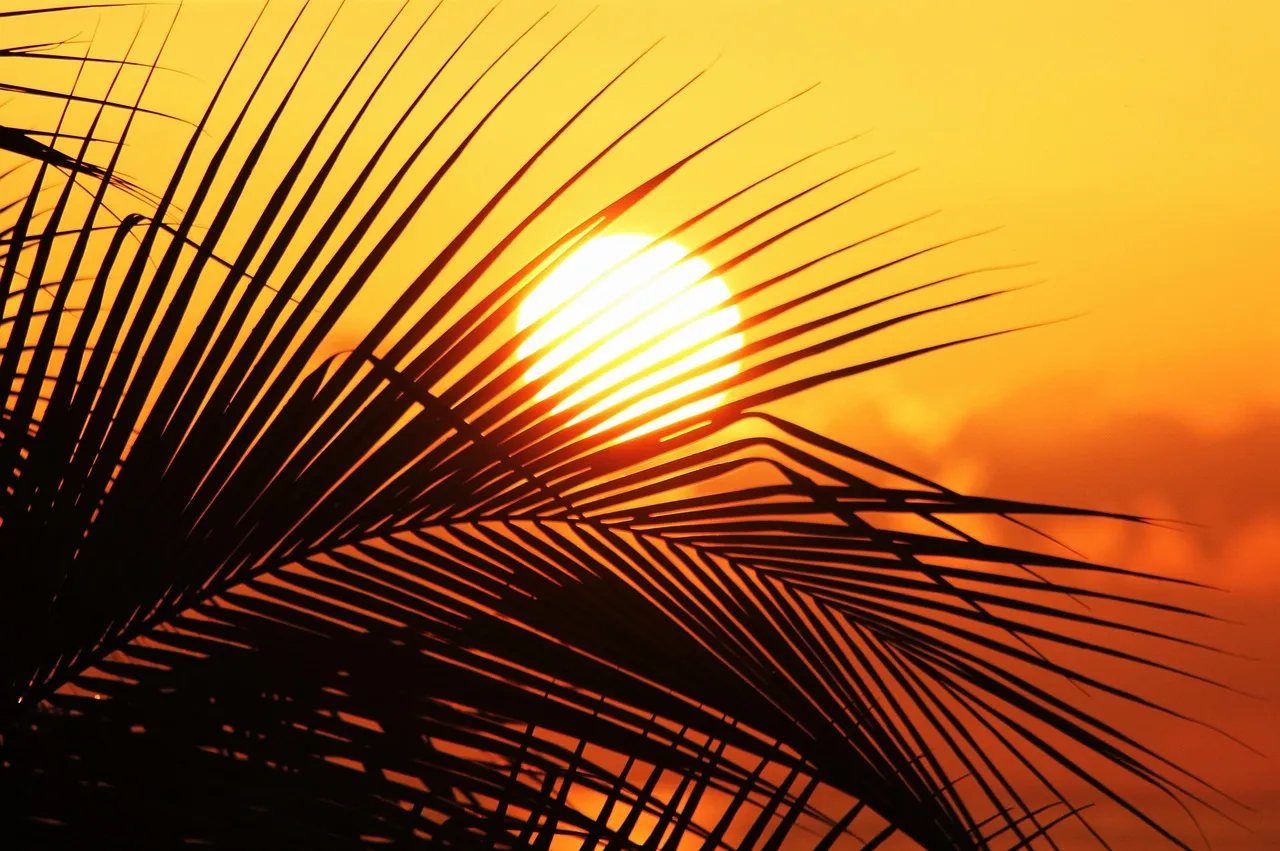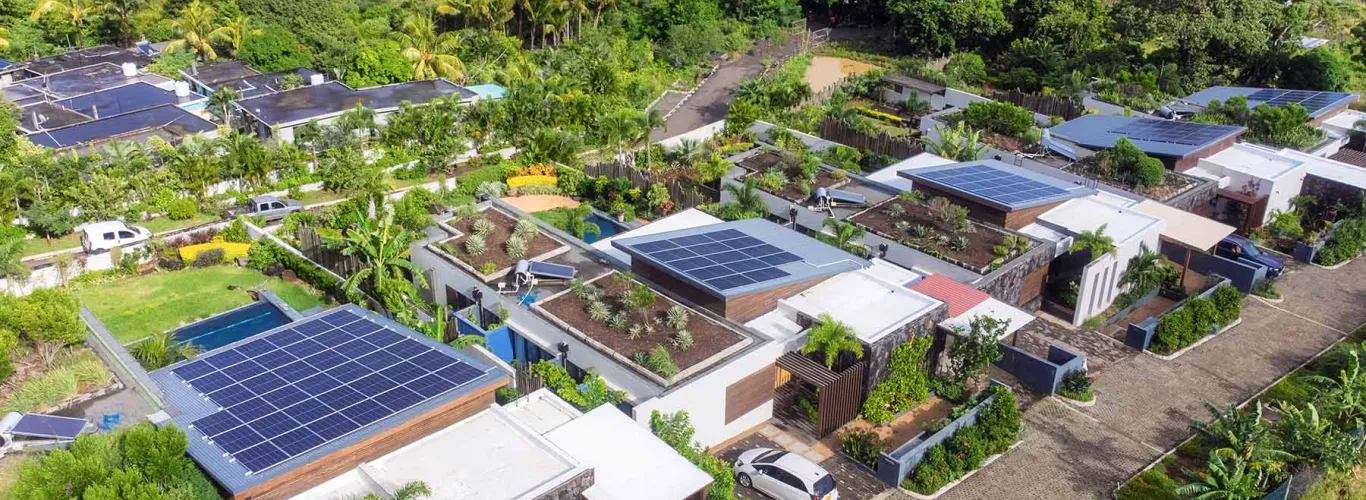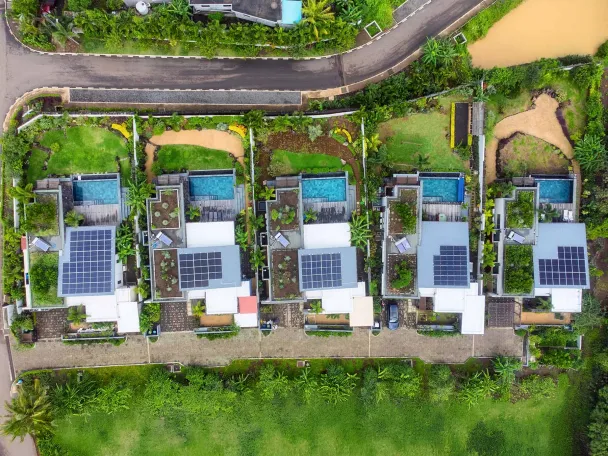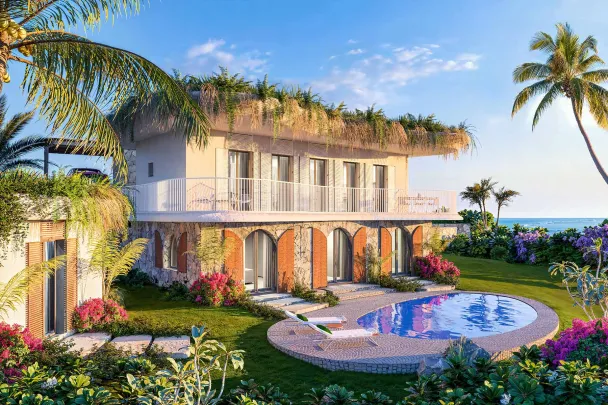As the energy transition becomes increasingly urgent, more and more households are looking for practical solutions to consume less, consume better — and above all, consume smarter. Photovoltaic solar power is emerging as an obvious choice: accessible, clean, silent… and remarkably efficient, especially in tropical climates.
In Mauritius, where the sun shines generously all year round, this technology makes perfect sense. It offers real energy savings, greater independence during power outages, and a tangible way to care for the planet.
With such abundant sunshine, solar power is clearly a smart choice. But what exactly is photovoltaic energy, and why is it such a great option? We break it all down in this article!

What is photovoltaic energy?
It’s a technology that converts sunlight into electricity, using solar panels installed on a roof, a wall, or directly on the ground.
Key advantages of photovoltaic energy
✅ Lower electricity bills
By producing your own energy, you rely less on the grid and reduce your monthly expenses.
✅ Clean and sustainable energy
Solar power doesn’t emit CO₂ — it’s a meaningful way to help the planet.
✅ Low maintenance and long lifespan
A well-installed system can last 25 to 30 years with very little upkeep.
✅ Increased property value
Homes equipped with solar panels are more attractive to buyers and renters.
✅ Energy independence and security
Less reliance on market fluctuations and power outages.
Photovoltaic energy: how does it work?
Photovoltaic energy is based on a simple yet ingenious principle: capturing sunlight and turning it into electricity. The panels contain cells that absorb the sun’s energy and convert it into usable electricity to power a home or building.
Each cell is made of semiconductor materials, usually silicon, which generate an electric current when exposed to light. The electricity produced is direct current (DC), and an inverter then converts it into alternating current (AC), compatible with standard household appliances.
This system not only produces clean electricity, but also reduces reliance on the traditional power grid. Depending on the size of the system and the level of sunshine, a photovoltaic installation can cover part or even all of a household’s energy needs. It’s a durable, silent, and increasingly affordable technology.
Photovoltaic vs solar panels: what's the difference?
The terms “photovoltaic” and “solar panel” are often used interchangeably, but they don’t mean exactly the same thing. “Solar panel” is a general term that includes two main technologies:
- Photovoltaic solar panels
These convert sunlight into electricity. They’re the most common type used to power homes, buildings, etc. - Solar thermal panels
These convert sunlight into heat, typically to produce domestic hot water (solar water heaters).
The term photovoltaic refers specifically to the technology that generates electricity from sunlight.
In summary:
- All photovoltaic panels are solar panels.
- But not all solar panels are photovoltaic — some are thermal.
Why is solar power ideal in tropical regions?
In a tropical country like Mauritius, photovoltaic energy makes perfect sense. With abundant and consistent sunshine, solar electricity production is especially efficient and cost-effective. It also offers a local solution to the growing need for energy independence, in an island context where electricity is expensive and largely dependent on imports.
Another major advantage in tropical countries like Mauritius: power outages can be frequent, especially during periods of high demand or during cyclones. A well-designed photovoltaic system, especially when combined with batteries, allows you to keep your home powered through it all.
The result? No need for a generator — which is often noisy, polluting, and expensive to run. Solar power offers a cleaner, quieter, and more economical long-term solution.
Our local partner: Reneworld Ltd
Reneworld Ltd is a pioneering solar company in Mauritius, founded in 2011 as part of the “Maurice Île Durable” initiative. Specializing in photovoltaic and thermal technologies, the company has completed over 5,000 residential installations, totaling more than 114 MW installed by the end of 2023.
In 2025, Reneworld took a major strategic step by entering the B2B market with the commissioning of a 1.6 MW solar farm spread over 2 hectares in Beau Plan. This facility can power 400 to 500 households and prevent 2,000 tons of CO₂ emissions annually.
Reneworld offers a comprehensive range of services: consulting, system design, installation, maintenance — all handled by an experienced local team. Thanks to its expertise and reliability, Reneworld has established itself as a key player in the solar energy sector in Mauritius.
At Domaine d’Anbalaba, solar energy for maximum comfort
All our Pomelo villas are now equipped with a complete photovoltaic system, designed and installed by Reneworld Ltd, featuring the latest generation batteries.
This smart system captures the abundant solar energy of Mauritius, stores it, and redistributes it when residents need it — especially in the evening or during power outages.
With 2 to 3 days of energy autonomy, residents enjoy full independence from the grid, without relying on noisy and polluting generators. This is a real advantage for facing the cyclone season calmly while making substantial savings.
Beyond practicality, it’s also a concrete commitment to a sustainable lifestyle, without compromising daily comfort.
In conclusion, photovoltaic energy is a strategic investment that helps reduce costs, gain energy independence, and embrace a sustainable lifestyle.
Under the Mauritian sun, this technology unfolds its full potential. So, why not take advantage of it?
Luxury bioclimatic villas in Mauritius
Domaine d’Anbalaba embodies harmony between real estate development and environmental respect. Located in Baie du Cap, an authentic fishing village, our estate spans over 15 hectares and blends seamlessly into its natural surroundings.
In addition to the Pomelo villas, our bioclimatic villas—Guetali and Rivulet from the Nomadic range—are designed with architectural principles adapted to the tropical climate, providing optimal comfort without the need for air conditioning in living spaces.


